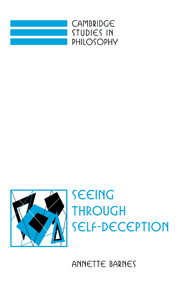Book contents
- Frontmatter
- Contents
- Acknowledgments
- Introduction
- 1 Other-deception
- 2 Two models of self-deception
- 3 The need for an alternative model of self-deception
- 4 Functioning to reduce an anxiety; satisfying a desire
- 5 Self-deceptive belief formation: non-intentional biasing
- 6 False consciousness
- 7 Intentional and non-intentional deception of oneself
- 8 Irrationality
- 9 What, if anything, is objectionable about self- and other-deception?
- References
- Index
2 - Two models of self-deception
Published online by Cambridge University Press: 09 November 2009
- Frontmatter
- Contents
- Acknowledgments
- Introduction
- 1 Other-deception
- 2 Two models of self-deception
- 3 The need for an alternative model of self-deception
- 4 Functioning to reduce an anxiety; satisfying a desire
- 5 Self-deceptive belief formation: non-intentional biasing
- 6 False consciousness
- 7 Intentional and non-intentional deception of oneself
- 8 Irrationality
- 9 What, if anything, is objectionable about self- and other-deception?
- References
- Index
Summary
If claim 1 were false, i.e., if deceivers must intentionally get themselves to believe something which they know or truly believe is false, and if one models self-deception on other-deception, then self-deception, as we saw earlier, appears to be doubly paradoxical. It seems to require that if I deceive myself, then:
(a) as deceiver, I must believe of some proposition that it is false, and at the same time, as deceived, believe that it is true, and
(b) as deceived, I must be taken in by a deceitful strategy that, as deceiver, I know to be deceitful.
If, as I argued, claim 1 is true, but deceivers must introduce into the deceived's situation something that the deceiver believes has a real possibility of causing the deceived to believe that p, and the deceiver takes that something to provide neither adequate evidence for p nor direct sensory awareness that p then while paradox (a) does not arise in self-deception if one models self-deception on other-deception, paradox (b) would arise.
Nearly all who write about self-deception have assumed that claim 1 was false, that the relevant sort of knowledge or true belief was a prerequisite for the intentional deception of another. While this assumption and the seeming paradoxes it engenders in self-deception when self-deception is modeled on other-deception have led some philosophers to doubt the very possibility of self-deception – a doubt which runs counter to a widespread conviction that self-deception is actual and pervasive – they have led many others to seek a resolution of the seeming paradoxes.
- Type
- Chapter
- Information
- Seeing through Self-Deception , pp. 18 - 33Publisher: Cambridge University PressPrint publication year: 1998



